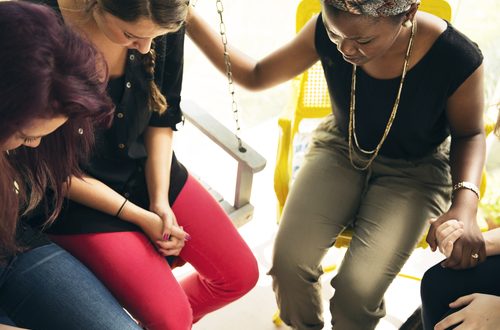
How Do We Love God with Our Whole Minds?
Today, I’m happy to feature as my guest columnist Ver-lee Cheneweth, my intern for the past year. You might remember meeting her last August when she shared about her journey relating to racism.
During Texas’s February 2021 snowmageddon, all schools, including the seminary I attend, closed for a week. Doing schoolwork in subzero weather was ridiculous, so I chucked it for some recreational reading. Obviously, enjoying a compelling book snuggled beneath a downy comforter was the only sane way to pass the time unvexed. After reading Jesus and John Wayne by Kristin Kobes Du Mez, however, I fumed, saying, “Dang it! What the heck is wrong with us? Why can’t evangelicals think critically? Maybe I should do a blog post on critical thinking?”
That’s when I downloaded Critical Thinking for Dummies on Kindle. (Baby steps, right?) Come to find out, being impartial, open-minded, and curious are essential skills in critical thinking; and forces like social conditions and circumstances can significantly alter opinions. Upon reaching Chapter 7, I hit information overload and needed an exit strategy. That, and the power had come back on. With an overdue Historical Theology paper whining in the corner, I abandoned Schrödinger’s Cat and beelined it to the book’s cheat sheet. Located at www.dummies.com/cheatsheet/criticalthinking, Dr. Cohen’s cheat sheet outlines five skills and traits of a “Good Critical Thinker.”
Embrace openness.
Discussing each critical thinking skill or writing a book review is not my goal here. Neither do I want to focus on winter or John Wayne, but instead Cohen’s assertion that sharpening critical thinking skills includes a “delight in hearing divergent views.” In other words, our thinking is improved by engaging different views. The advantage of listening to various opinions spoke to my heart because of evangelical tribalism, which breeds a toxic environment ripe for deception.
As it turns out, evangelicals need openness to engage divergent ideas and views to have any hope of critical thinking. Sure, our biases are impossible to recognize and harder to overcome. But if we close our ears to differing theological opinions, if we cut ourselves off from the varied views of our brothers and sisters in Christ, we reject the opportunity to learn and grow in Christ. Consequently, the gospel suffers. And to critically evaluate our strengths and weaknesses, evangelicals need the input of the global church.
Check blind spots.
Case in point: I recently took a class on spiritual formation from a historical perspective. Studying two thousand years of Christian life and witness dredged up Protestants’ ugly blind spots. Prejudices. Such blind spots keep us vigilantly guarding our convictions, but they also keep us from growing deeper in faith and love. Not surprisingly, we’re particularly blind to our own sin. We need the community of faith to see ourselves rightly and thrive.
In his book, Water from a Deep Well, Gerald Sittser explains that “Every generation of believers faces the risk of becoming a prisoner to its own myopic vision of the Christian faith, assuming that how it understands and practices faith is always the best.” We need the legitimate challenge of multiple perspectives to expose weaknesses and errors that shackle our particular brand of Christianity. Theological bias keeps us isolated from other believers and our Christian heritage’s valuable resources for spiritual growth. I have been challenged and inspired by the diversity of spiritual traditions (in the early church, Eastern Orthodoxy, and the Roman Catholic Church) and their practices to promote believers’ holiness.
One of the aspects of church history that challenged me is stories of the martyrdom of the saints. Jesus taught that the world would hate and persecute those who followed him (Matt 5:11–12; John 15:18), and it is identification with Christ that caused many believers to give up their lives prematurely in the early church, as in the modern era.
The Center for the Study of Global Christianity estimates that one million Christians were martyred between 2000 and 2010. That’s an average of 100,000 believers killed each year. Over the centuries, persecution has been both state-based and society-based (political, cultural, and social persecution). Yet regardless of persecution’s cause, the martyrs focused their hope on Christ and His kingdom, not earthly security, prosperity, or comfort. And if our prototype for Christian living is Christ, “cruciformity,” or Christlikeness, will be the defining characteristic of believers’ lives. Physical martyrdom may not be the American Protestant’s destiny, but a life of self-giving and self-renouncement still means death to self-serving policies and injustices for God’s glory and others’ well-being.
See beauty.
I was also surprised and inspired as I learned of the beauty of the Eastern Orthodox tradition of using icons to educate believers and stimulate spiritual growth. Understanding the meaning behind the pictures depicted in icons—seeing themes taught in the images—has helped me make sense of how a person inhabiting an oral culture could grasp biblical truth and grow spiritually. In his essay, Christian Formation in the Early Church, Robert Louis Wilken writes of the early church’s focus on images: “Stories were narrated through words, but they were really a form of seeing. They did not portray ideas, but deeds, the actions of individual human beings. Hence, they could also be told through pictures, and much early Christian art has a didactic purpose.”
Additionally, throughout the semester, I have been overwhelmed by the Roman Catholic tradition’s vast spiritual richness. The big-picture ideas of the rhythms of church life, the prominence of the sacraments, prayer, and the Christian community’s significance are all deep wells from which Protestants can draw and grow in our understanding of spiritual formation. The monastic tradition also emphasizes the importance of community, prayer, disciplined study, a contemplative approach to life, and an intentional desire to grow in purity and holiness. Is anyone going to argue that evangelicals, and for that matter, all Christians, don’t need help with purity and holiness? #ChurchToo.
Know our history.
The truth is, we need each other. All Christians need to evaluate information and sources and think critically about culture and theology to avoid deception. In his book, Retro-Christianity: Reclaiming the Forgotten Faith, Michael Svigel challenges evangelicals to think “both critically and constructively about history and how it informs our current beliefs, values, and practices.”
Sadly, not many evangelicals are interested in church history. So, perhaps it’s time to reacquaint ourselves with our brothers and sisters of other traditions to relearn lessons from the past. Evangelicals need reminding of the church’s identity—lovers of God and lovers of one another. We need to refocus on Christ and submit to the cleansing and leading of the Holy Spirit. Dependence on God and interdependence with one another is God’s relational blueprint for success. So, evangelicals need to nurture a culture of accountability instead of lone rangers.
All effective change requires prayer and humility. Contrary to popular belief, evangelicals can learn from church tradition and be better for it. We need to widen our perspective of the body of Christ and acknowledge that we can learn from the Eastern Orthodox and Catholic traditions and other Protestant denominations that some of us regularly thumb our noses at! Reading, teaching, and preaching the Word is a priority for evangelism as well as spiritual growth. Still, understanding and implementing other Christian liturgies has the potential to release a fresh breeze of unexpected blessings.
How can we educate evangelical believers in church history that predates the Declaration of Independence? One way is to invite a broad range of vetted voices to speak to us. That means reading broadly and incorporating new old rhythms of Christian worship into our lives. Perhaps the Holy Spirit will spark renewed joy and zeal for holiness and sacrificial living.
Evangelicals will flourish as we evaluate information and sources critically and think deeply about what we believe and value. And to think critically, we need accurate data. Choosing to listen to others requires humility—there is the possibility that we might be wrong. Reading Jesus and John Wayne challenged my presuppositions about evangelical goals in America’s cultural narrative and pushed me to examine my critical thinking skills. Do I delight in hearing divergent views? Or am I entrenched in my theological perspective like the Arctic freeze that blanketed Texas? I want to know truth and grow in understanding—”even if it turns out to undermine [my] own previously held convictions and long-cherished beliefs” (Cohen’s fifth characteristic of a good critical thinker). Moreover, Scripture commands us to love the Lord our God with all of our minds, so seeking truth and developing critical thinking skills is about our relationship with God as well as with others (Luke 10:27). When Christians listen to one another, we celebrate our unity in Christ, and our thinking is sharpened. Who knows, perhaps humility and repentance will adorn the gospel and attract others to Christ. But do we have ears to hear?
P.S. Just for the record: No animals, including Schrödinger’s Cat, were harmed in the writing of this blog post.
Photo by Niklas Veenhuis on Unsplash.



